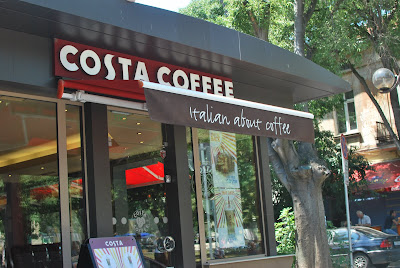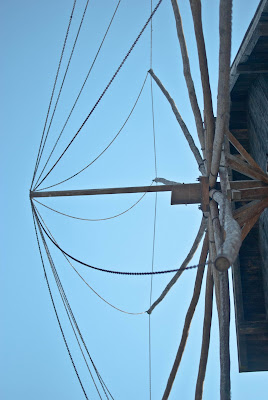
Tuesday this week I left USA to spend the next two months in Bulgaria for my practicum – research and interviews with Bulgarian grandmothers. I left my kids and husband back in Virginia. As the last days tick-tocked to a close I kept thinking that it was a crazy idea to go chasing after old stories and leave my girl home crying. It was a difficult good bye.
I decided to be mindful of what comes my way, to notice. First mindfulness exercise met me at the airport. Without the kids around my mind was unusually free to roam and observe the surroundings.
The security lines were tiresome and long. I tried to pick out faces in the sea of people as the colors and themes kept changing within seconds.
I noticed parents everywhere -
African, Indian, White, dressed in traditional and modern clothes, keeping a vigilant eye on small and older children - some excited, some asleep in their arms, some crying. Mothers juggling like six armed Indian goddesses sleeping babies, diaper bags, plastic toys and monster strollers that had to be collapsed and fitted into the ex-ray controls.
Happy people coming back from vacations with straw hats, sandals and tan bringing into the sterile environment the smell of salt water. Others going home first time in years, the bulging ten suitcases per family and all the presents I envision for the relatives five times removed. I should know that - this time I travel light – only one extra suitcase for family...
A rabbi with a pointy hat and long wise beard.., a businessman with polished black shoes and conventional suit, his dignified manners somewhat ruined by the sight of his socks and the shoes in the gray tray. A loud group of American students ushered by the leaders, thank God to some other plane and destination.
The sting of envy when passing by the chairs/beds of business class in the airplane. They are already seated and talking on their cellphones or checking their Macs. The others are like sardines, somewhere in the back hidden by the discrete curtains.
I sit by the window. I could enjoy the view and keep the bathroom breaks to a minimum.
Midnight EST. Most are asleep or watching movies on their little screens. I open the shutter of the window. It is still very dark with the sky the hint of gray. A small spot of red light under the plane - plane signal? Oddly enough it is growing.
The next one hour I witness a spectacular dawn as we fly East.
The red grows and cuts a wedge between the blue beyond of the horizon and the solid landscape of clouds - a hot blade cutting through light and dark. The colors of it change to orange and yellow and the blue of the sky becomes more luminous. A river of Russian gold begins spilling across the horizon growing in magnitude. Even though I am prepared for the explosion of light still it is unbearable to look at the blinding sun.The massive dark clouds have become feathery veils revealing the ocean and approaching land. No objects have obscured the the divine drama.
It was this same week that I thought of a verse from Isaiah 58 which happened to pop in my head as the sun rose:
“Then your light will break forth like the dawn, and your healing will quickly appear.”
Well, when is that then, after what?! When will there be healing, when will healing be as dramatic as the beginning of a day? What is healing for me and what is healing for my people, what are the signs? Hear a prophetic voice, sounds as fresh today as it did thousands of years ago:
1 “Shout it aloud, do not hold back.
Raise your voice like a trumpet.
Declare to my people their rebellion
and to the house of Jacob their sins.
2 For day after day they seek me out;
they seem eager to know my ways,
as if they were a nation that does what is right
and has not forsaken the commands of its God.
They ask me for just decisions
and seem eager for God to come near them.
3 ‘Why have we fasted,’ they say,
‘and you have not seen it?
Why have we humbled ourselves,
and you have not noticed?’ “Yet on the day of your fasting, you do as you please
and exploit all your workers.
4 Your fasting ends in quarreling and strife,
and in striking each other with wicked fists.
You cannot fast as you do today
and expect your voice to be heard on high.
5 Is this the kind of fast I have chosen,
only a day for a man to humble himself?
Is it only for bowing one’s head like a reed
and for lying on sackcloth and ashes?
Is that what you call a fast,
a day acceptable to the LORD?
6 “Is not this the kind of fasting I have chosen:
to loose the chains of injustice
and untie the cords of the yoke,
to set the oppressed free
and break every yoke?
7 Is it not to share your food with the hungry
and to provide the poor wanderer with shelter—
when you see the naked, to clothe him,
and not to turn away from your own flesh and blood?
8 Then your light will break forth like the dawn,
and your healing will quickly appear;
then your righteousness will go before you,
and the glory of the LORD will be your rear guard.
9 Then you will call, and the LORD will answer;
you will cry for help, and he will say: Here am I.
“If you do away with the yoke of oppression,
with the pointing finger and malicious talk,
10 and if you spend yourselves in behalf of the hungry
and satisfy the needs of the oppressed,
then your light will rise in the darkness,
and your night will become like the noonday.
11 The LORD will guide you always;
he will satisfy your needs in a sun-scorched land
and will strengthen your frame.
You will be like a well-watered garden,
like a spring whose waters never fail.
12 Your people will rebuild the ancient ruins
and will raise up the age-old foundations;
you will be called Repairer of Broken Walls,
Restorer of Streets with Dwellings.
 Saw an old man playing a flute today near the National palace of Culture (NDK) in Sofia. I was hurrying by, but there was something so desperate about the music that I retreated my steps and gave him 5 leva, not much... He looked up at me surprised and said: "I had almost given up, There is God." I decided that whatever I was doing could wait and stood there talking to him.
Saw an old man playing a flute today near the National palace of Culture (NDK) in Sofia. I was hurrying by, but there was something so desperate about the music that I retreated my steps and gave him 5 leva, not much... He looked up at me surprised and said: "I had almost given up, There is God." I decided that whatever I was doing could wait and stood there talking to him. 




































